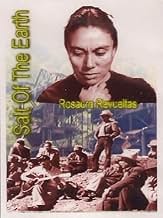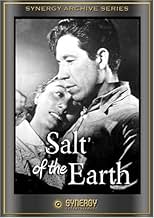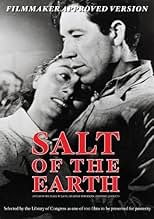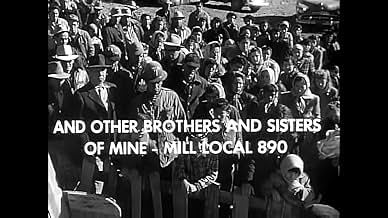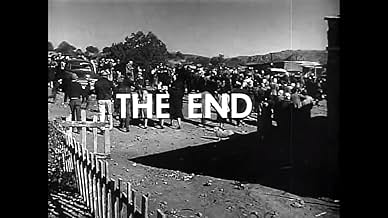Ajouter une intrigue dans votre langueMexican workers at a zinc mine call a general strike. It is only through the solidarity of the workers, and importantly the indomitable resolve of their wives, mothers, and daughters, that t... Tout lireMexican workers at a zinc mine call a general strike. It is only through the solidarity of the workers, and importantly the indomitable resolve of their wives, mothers, and daughters, that they eventually triumph.Mexican workers at a zinc mine call a general strike. It is only through the solidarity of the workers, and importantly the indomitable resolve of their wives, mothers, and daughters, that they eventually triumph.
- Réalisation
- Scénario
- Casting principal
- Récompenses
- 4 victoires au total
- Ramon Quintero
- (as Juan Chacon)
- Barton
- (as David Wolfe)
- Consuelo Ruiz
- (as Angela Sanchez)
- Charley Vidal
- (as Ernest Velasquez)
Avis à la une
Most filmmakers went along with this state of affairs, some prosecuting, others dobbing in their former friends and colleagues. Any director wanting to be critical - eg Sirk, Ray - had to do so covertly, sublimating their protest through genre, form or allegory. What is so heartening and jolting about this film is that it dares to say out loud what it means. This is not surprising, as all the key crew members had been blacklisted and director Biberman had served six months for not cooperating with the HUAC. It is not negative, but celebratory. It is, as the dedication implies, a most American film, a light of liberty in a very unAmerican darkness. Of course it was banned, the production undermined by the government, the FBI and local vigilantes, while Rosaura Revueltas, the Mexican actress in the lead, was repatriated, never to work again.
SALT OF THE EARTH tells the story of Esperanza (hope), a poor New-Mexican housewife living in impoverished, insanitary conditons, whose husband Ramon works in salt mines once owned by her grandfather, now exploited by vicious American capitalists. Conditions in the mines are appalling, and after a fatality due to deliberately lousy safety measures, the men go on a strike which stretches out for months, intimidating incoming scabs. When the corrupt sheriff slaps a court order on them, their wives take up striking duty.
Of course, the film is a riposte not only to latterday 'America' but also the Hollywood that served it. Demonised as red propaganda, it is anything but - propaganda is an attempt by the ruling class to brainwash its subjects through lies and false promises; this beautiful film is a statement from an embattled peoples with no voice in the mainstream media. This film breaks all the rules (for once one can say this and actually believe it!). Its subject matter is work, the working classes, the right to work. It features no Hollywood stars (indeed, many of the actors, as in an Italian neo-realism film, are locals), no racist melting pot aspirations, but genuine ethnic people with their own culture and customs. In a reversal of current Hollywood practice, it is the white man who is marginalised and demonised.
What is remarkable about the film, which is essentially a plea for help, is how politically sophisticated it is. It would have been perfectly understandable for the filmmakers to simplify their message in the current political climate, but they hearteningly refuse to do so. Although the fascist mine-owners and lawmen are clearly villains, the film explores the tensions within the very patriarchal New-Mexican community itself. The union links workers' rights with racial equality, but the men do not extend this to women. But this is the story of a woman, a meek housewife who is transformed into an active worker, a full woman, someone with a voice and a very powerful role in society. Like a Hollywood film, SALT does dramatise its social subject matter around one main couple, but this crystallises, rather than dilutes, the issues. The men see the increasing power of the women as further humiliation of their power, but divided by gender the New-Mexicans have no power, they are despondent, starving, at the mercy of sadistic capitalists. Together they have extraordinary power, culminating in the remarkable evicition scene, a rare celebration of group power in the American cinema - one of that cinema's most powerful scenes.
Esperanza moves from a position of having no voice in society, no public arena like the men in which to speak, indeed barely a space in her own home, where her dreams and desires are transferred to a radio playing other people's songs; to a political activist, someone who does not limit her life to housework and children, indeed demands her husband does his share, and this is represented by her narration, her power to tell and control a story, to speak authoratively for a people, to translate for us their language.
The 'emasculation' of the men provides the film with some of its funniest scenes, but there is a darker side to New-Mexican masculinity - the implied wife-beating, for example. In one of the most heartbreaking sequences, despondantly humiliated, they see a magazine picture of their enemy about to go out hunting, 'a man of distinction', and they decide to imitate him, erasing themselves, their pride and responsibilities. It is their lowest ebb.
Like I say, the film has its flaws. There is a naivete to the neo-realist model that allows for a proto-hippy idealism that is not always convincing. The strongly political form of the film sometimes slips into the drama, making certain scenes seem didactic and unreal. Sometimes you wonder what a Bunuel might have done with the material. But this is an honorable treasure in the American cinema, which should always be shown to remind us that we do not always have to cow to tyranny.
My grandfather was a coal miner in southern Colorado, and the coal-mining industry (and its effects on Hispanos of the Southwest) has been an interest of mine all of my life. Quite simply, this film brought history to life for me. The actors, location, themes, language, and other details were so authentic, that I felt I was watching a documentary at times. I felt a spiritual connection to my grandparents, who lived and worked in coal mining camps in the early part of the 20th century. I grew up hearing their stories, and the devastation of the Colorado Coalfield Wars and the Ludlow Massacre.
This is, quite simply, a stunning cinematic achievement, especially given that it was written and filmed in 1954. Sadly, many of the prejudices and themes in the film resonate today. Little has changed for many of the hardworking Hispanos who have called the Southwest home for centuries.
Against this backdrop, Salt of the Earth appears to have parachuted in from another planet. In retrospect, the film's look, feel, and values, plus use of non-actors, represent an anti- Hollywood aesthetic in just about about its purest form. Instead of the usual ersatz, there are company shacks, a desolate land, and real workers sometimes speaking a foreign tongue about hot water and labor solidarity. This was and is about as far removed from the fabled dream factory as any commercial film before or since. To my knowledge, Salt is the only professional movie made in America by known communists. And though I've seen it a number of times, I've yet to detect a theme that any conscionable liberal would disagree with. The emphasis throughout is on reform, not revolution.
So why was the movie so thoroughly ostracized. Aside from the obvious negatives, there are two aspects that challenge patriotic assumptions about the power of the individual. The strikers win because of their solidarity, that is, their capacity to overcome internal divisions in pursuit of common goals. But more importantly, theirs is a leaderless solidarity. Unlike so many other labor films, no one person arises in Salt to take charge or direct the actions of the others. No single iconic personality dominates. Community of labor is the real agent of change and victor here, while no one individual can be pointed to as indispensable. Second, through the pivotal role of Esperanza (a professional actress), the individual is shown as flowering amidst the common effort. Far from being submerged in a faceless mass, she discovers through participation a heightened sense of individualness and a wealth of hidden talents. Moreover, a stronger, more confident Esperanza means a stronger, more confident strike effort. In short, it's not individuality versus the group, but individuality from within the group. I don't know how subversive these ideas ultimately are, but I do know they challenge decades of iconic film-making, in which the omnipotent movie star, a John Wayne or a Sylvester Stallone, is transformed into a demi-god and exalted above the common folk. Against this grain, Salt seeks to empower its audience, not dis-empower.
There are many fine touches in the film. I'm glad the workers are not romanticized, nor are the bosses or their law-enforcement allies caricatured. Instead the hardscrabble families are treated as ordinary people, able, nevertheless, to act intelligently beyond the cultural limits placed upon them. Ordinarily, the viewer would expect a heavy hand with such politically charged material; however, the producers have the good sense to hew to a lighter approach that features unexpected deposits of humor, as when the men whine about being forced to hang out the wash. This furnishes both a good laugh and an incisive piece of social commentary. In fact, most of the movie's considerable humor comes from its strong feminist subtext, certainly a striking exception to the Ozzie and Harriet stereotypes of the period.
Despite an obvious appeal to cultural historians, Salt is much more than a mere artifact. There is, of course, no more Mc Carthy-led purge, and miners' wives have long since gotten hot water and indoor plumbing thanks to labor militancy. Nevertheless, the film's social themes continue to reach beyond that long-ago period. Women continue to strive for equality, just as the workers' wives in Salt struggled as domestics against the chauvinism of their husbands. Moreover, the need for racial equality remains as pressing now as it was in Michael Wilson's prescient screenplay. And, of course, there's labor's ongoing battle to get something like a fair share of the wealth it produces. Far from being a dead artifact, the power of this suppressed treasure along with the courage of the men and women who made it, continues to echo across the decades, furnishing inspiration to generations to come.
That alone is praise!
SALT OF THE EARTH, a powerful film shot on a threadbare budget, mostly with local non-actors, was branded as "communist propaganda" during the infamous McCarthy "Red Scare" and was hardly shown in the USA when first released. However, the film was widely exhibited in Europe, where it was lauded with acclaim. It wasn't until the 1960's and 1970's that anyone in the USA had a decent chance to see this powerful work, and then only in film festivals, union meetings, or college campuses.
It is not propaganda. It is about the struggle for dignity and recognition. The making of this film it testament to that alone! For fear of destruction by "anti-communist" technicians, the film stock had to be smuggled into development labs and worked on in secret! Director Herbert J. Bieberman was arrested during filming, and had to give scene directions by letter and telephone while in prison.
The film the U.S. Government didn't want you see...now part of the National Film Registry. Consider watching this as driving a stake through Joe McCarthy's heart.
Le saviez-vous
- AnecdotesBecause the producers feared both sabotage and destruction of the film, the exposed footage had to be developed in secret, at night, by a sympathetic lab technician, with the film delivered in unmarked canisters.
- GaffesWhen Ramon is in the bar, his hands change position several times between shots.
- Citations
Esperanza Quintero: Whose neck shall I stand on to make me feel superior, and what will I have out of it? I don't want anything lower than I am. I am low enough already. I want to rise and to push everything up with me as I go.
- Crédits fousOpening credits prologue: our scene is NEW MEXICO LAND OF THE FREE AMERICANS WHO INSPIRED THIS FILM
HOME OF THE BRAVE AMERICANS WHO PLAYED MOST OF ITS ROLES.
- ConnexionsFeatured in Precious Images (1986)
- Bandes originalesWe Shall Not Be Moved
(uncredited)
Traditional
Sung by the women on the picket line
Meilleurs choix
- How long is Salt of the Earth?Alimenté par Alexa
Détails
- Date de sortie
- Pays d’origine
- Langues
- Aussi connu sous le nom de
- Salt of the Earth
- Lieux de tournage
- Sociétés de production
- Voir plus de crédits d'entreprise sur IMDbPro
Box-office
- Budget
- 250 000 $US (estimé)
- Durée1 heure 34 minutes
- Couleur
- Mixage
- Rapport de forme
- 1.33 : 1
Contribuer à cette page



